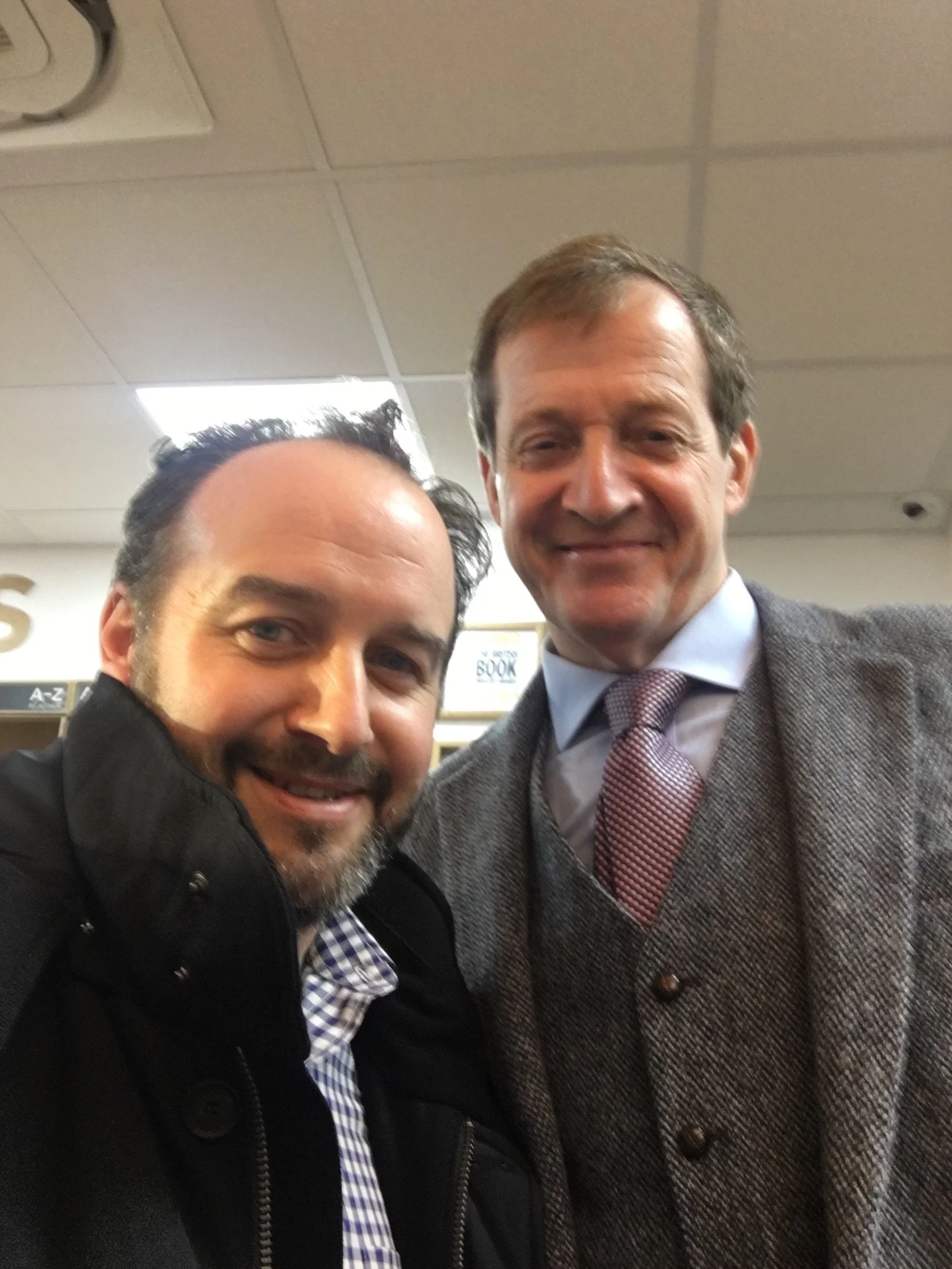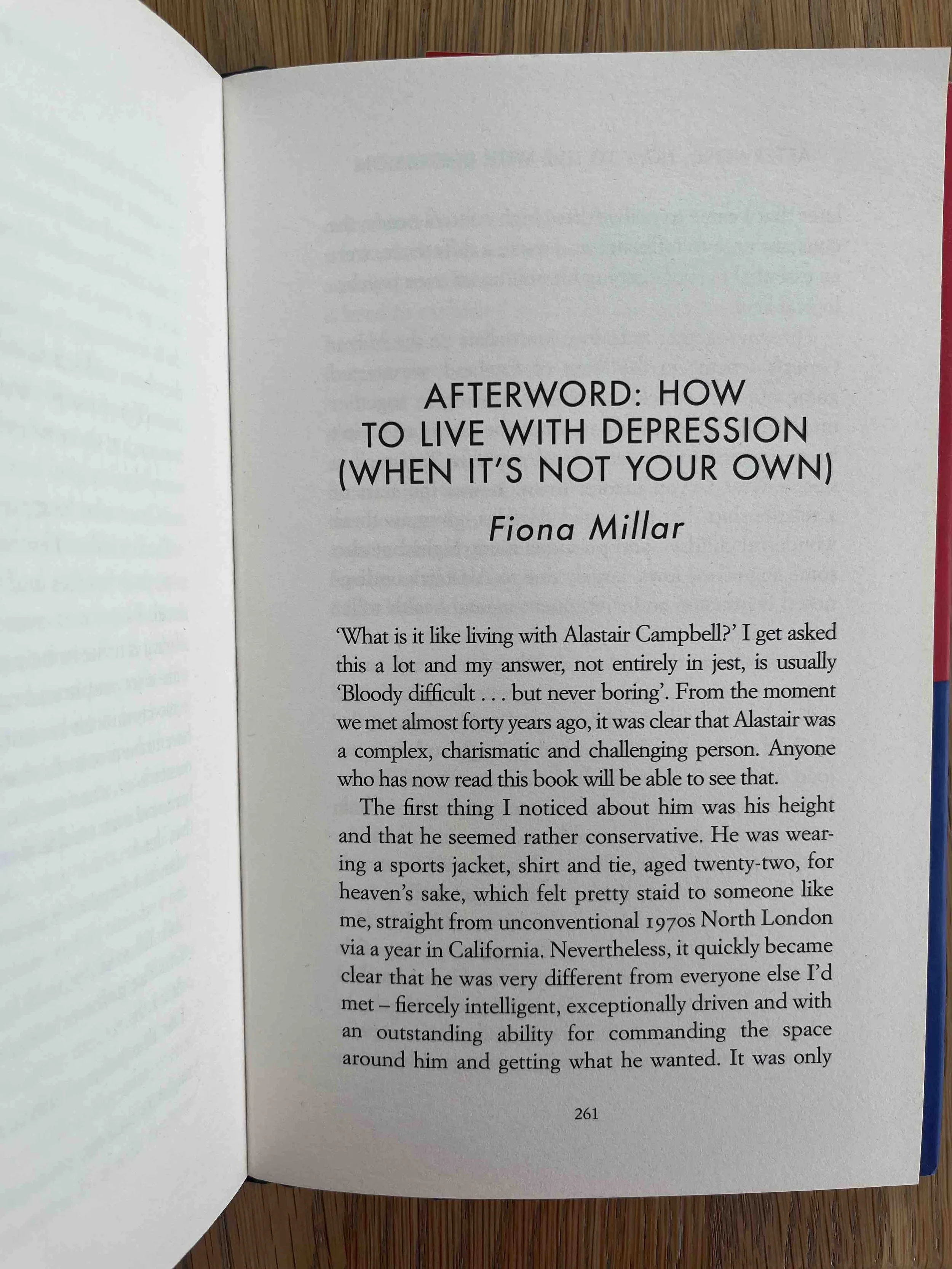Trying to help someone with their mental health: a tough, sometimes, helpless journey.
It’s no secret that I admire Alastair Campbell.
I’m an avid follower of his blog and buyer and reader of his books. I follow him on social media and regularly like the content he posts about mental health and his own experience of living with depression. He has done exceptional work in helping to confront stigma towards mental health, especially for men and for people in high profile positions, in which speaking openly about your mental health has been seen (and is still sadly often seen) as a sign of weakness. I quote him often when I speak at events on mental health and when I talk to clients about the idea of the mental health jam jar which he first brought to my attention through his book, Living Better and a BBC documentary.
Many years ago - when I had hair (photo included with this post to prove it!), I was walking through Euston Station when I became aware he was doing a book signing. Courage summoned up to approach him; book bought; book signed; and, obligatory selfie later, I boarded my train home for Liverpool.
For all his inspiring work, one of the things he has done which has moved me most and stayed with me longest was him asking his partner, Fiona Millar, to write a chapter in ‘Living Better’ about her experience, and by extension, the experience of others who live with and/or support someone with depression or indeed any mental health condition. Fiona’s honesty - and superb writing - brought to life something which I think about a lot and discuss with many clients: the impact that a loved ones’ depression (or *insert other mental health challenges, such as anxiety) can have on those close to them and how difficult it can be to understand and then to know “the right thing to say”.
Like many people who talked with loved ones about their anxiety and/or depression, I had my fair share of painful and upsetting conversations and interactions with people close to me. I felt they didn’t always understand what I was going through and their comments, or questions, or looks, or body language left me feeling judged. This stung. This added to my feelings of failure. Of being worthless. It was deeply wounding. But it wasn’t their fault. It wasn’t my fault either, but it certainly wasn’t theirs.
As I often say when speaking with groups (or occasionally clients) about my lived experience, how could I expect someone else - no matter how loving and caring - to understand what I was going through when I didn’t understand it myself. An example. When hitting a depressive episode, sometimes there is a clear trigger. An event. A comment. A series of setbacks. Tiredness. Being overstretched and/or stressed. But sometimes, there is nothing. No obvious cause or trigger. No pinpoint-able instigator. Just the darkness that descends: the sunglasses on my eyes making everything seem less in focus and less clear. The pyjamas over my trunks as I try to swim across the pool.
Being asked “why do you feel like this?’ rarely helped and more often than not would make me feel worse about what was happening and worse about myself. The temptation would be there to hit out at the questioner: the last thing I need is for you to be questioning me and making me feel worse!
We know in these moments that isn’t a “right thing to say” or a magic phrase or comment that will make it all go away and yet we can get annoyed when “the wrong thing” is said. The same is true - for me - when people try to tell you to stop feeling like you do - as if it’s a choice you are making. Just don’t worry about it. Stop thinking like that. Don’t be silly; It is going to be fine etc etc. These are all attempts to help us; to soothe; to make us feel better, and yet they don’t work - they can leave us feeling othered, judged, dismissed, minimised or worse.
What’s the answer? How can people who want to help really help? What can they offer us?
Empathy and quiet.
Empathy is the greatest gift we can offer. The idea of trying to get into someone else’s shoes and try to see things from their perspective. Not making assumptions about how they feel, or should feel, but to genuinely want to try to understand and see things as they see them. Carl Rogers, whose work underpins my practice as a person-centred therapist, saw empathy as entering the perceived world of another person, listening with sensitivity and showing no fear or judgment toward what they express. The key words here are listening and no judgment.
Perhaps instead of trying to find the right thing to say, we should find the right way to listen. To enquire, gently, but to focus on the words of the person who is struggling, not on our own words which we hope - with all the best intentions - will take away their pain. It won’t. It can’t. But feeling held, loved, cared for, not judged and believed can help hugely.
Which brings us to quiet. Listening requires us not to speak but to sit and hear. Truly hear what is being said. Sitting with these feelings that are shared with us - often deeply painful, sad or uncomfortable feelings - is very tough but essential if we want to help those in distress. Often the reason we seek to speak in response to what we are hearing is because it brings us deep discomfort. We feel bad when we hear them. We want them to go away. Learning that it is not our job, or even possible, for us to fix the problem or the person - to make the feelings go away - is a huge step in being able to help the person in front of us.
I have been lucky beyond words to have Aileen (my wife - the great Dr J) with me through my breakdown and recovery, which is an ongoing, daily effort. Aileen understands the power of a hug and holding space for me - not trying to fix me. She knows how to sit with my discomfort in those tough moments and in doing that gives me the space to feel that whatever I am feeling is ok, even if it feels far from ok.
I know too, that it is incredibly tough for her - as it is for the rest of my family and others who care about me. My feelings and challenges can bring up guilt in them - a sense that somehow it could be there fault that I feel the way I do - that they cannot make me happy - or they have somehow caused what has happened. This is deeply painful for them - as it is the feeling they cannot make it better.
Make it stand out
Whatever it is, the way you tell your story online can make all the difference.
Back to Fiona Millar and one of her insights. She talks about helplessness and the feeling of not knowing what to do to help and trying to manage the feelings that the episode of depression (and some of the behaviours and words that flow from it) are not about her or, put another way, to punish for something they have done or should have done.
I guess I would say this wouldn’t I, but she writes compellingly about the need for professional help and input. Therapy and medication. She also writes about understanding your own limitations as a loved one who is trying to help and that “unless someone actually wants helps, you can’t make them take it.”
It can be hard as a loved one to feel you are not helping enough or frustrating when you see progress being slow, or seeing no progress at all. But no amount of words or actions on your part is going to make the difference. Holding space. Listening. Caring. Being there. That is what can make a difference, but only if the person in pain is ready to get help.
I thank Alastair for his openness and his work over many years but is the Fionas in our lives that deserve just as much thanks, if not more. The lived experience of having anxiety, depression and/or any other mental health condition can be brutal - it has been in my life. But the lived experience of caring about someone going through all of that has its own deep pain and brutality. Some empathy with that lived experience would be helpful too.



